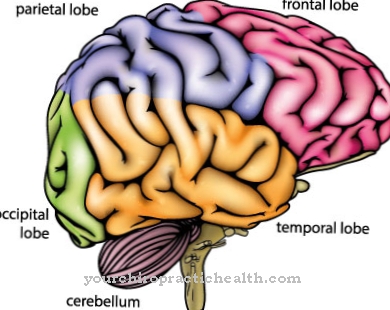At a Mitral valve regurgitation the heart valve located between the left atrium and the left ventricle is no longer able to close completely. Mitral valve regurgitation is the second most common valve defect in adults with an incidence of around 2 to 3 percent.
What is mitral regurgitation?

© bilderzwerg - stock.adobe.com
A Mitral valve regurgitation occurs when the closing function of the heart valve, which is located between the left atrium (atrium cordis) and the left ventricle (ventriculus cordis), is so reduced that the blood partially flows back from the heart chamber into the atrium during the heartbeat (regurgitation ).
As a result, a certain amount of blood continuously shuttles back and forth between the left atrium and ventricle (pendulum volume), with a pendulum volume of 15 percent of the stroke volume being referred to as a relevant mitral valve insufficiency. As a result of this constant pendulum movement of the blood, the ventricle and atrium expand increasingly (dilation), while the performance of the left ventricle is more and more restricted (left heart weakness).
As a result of the increased blood volume in the left atrium, the blood can back up into the lungs. The increased blood pressure there (pulmonary hypertension) leads in the long term to the fact that the water in the blood is pressed into the lungs. The right ventricle is increasingly unable to supply the lungs with blood. There is a permanent overload and finally a right heart failure.
Cardiac arrhythmias and atrial fibrillation, blood clots in the affected atrium, reduced performance, shortness of breath and edema when the right ventricle is involved are characteristic symptoms of mitral valve insufficiency.
causes
A Mitral valve regurgitation is in most cases due to rheumatic or bacterial endocarditis.
As a result of the inflammation of the inner lining of the heart, scar tissue develops, which can narrow and leak in the mitral valve. In addition, rheumatic fever following a streptococcal infection can affect not only the joints and the brain but also the heart structures or the mitral valve and cause insufficiency.
In addition, mitral valve insufficiency is associated with mitral valve prolapse (malformed mitral valve apparatus), myocardial infarctions (heart attacks), hypertrophic obstructive and dilative cardiomyopathy (heart muscle disease) and calcifications (calcifications) of the valve ring. Mitral valve insufficiency can also be congenital or traumatic (tear in the tendon threads).
Typical symptoms & signs
- Cardiac arrhythmias
- Palpitations and / or palpitations
- Heart murmurs
- Atrial fibrillation
- thrombosis
- Low resilience
- Shortness of breath
- Edema
Diagnosis & course
A Mitral valve regurgitation can be diagnosed as part of auscultation (listening) with a stethoscope based on the audible blood reflux through the affected mitral valve.
The characteristic changes in the heart (enlarged left atrium) and potential pulmonary edema can be demonstrated by an EKG (echocardiogram) and an X-ray. In addition, as part of a cardiac catheter examination, in which a catheter is advanced to the heart via a larger body vein under local anesthesia, the exact pendulum volume and thus the disease stage can be determined.
The prognosis and course of mitral valve insufficiency depend heavily on the severity and degree of progression of the disease. On average, about 25 to 40 percent of those affected who have not had an operation are alive five years after the diagnosis, while the mortality rate for valve replacement is considerably lower (20-40 percent).
Complications
The mitral valve regurgitation results in serious heart problems in the patient. In the worst case, these can lead to the patient's death if treatment for this disease is not initiated. As a rule, those affected suffer from palpitations or palpitations.
Disturbances of the heart rhythm can also occur, leading to unusual noises in the heart. Those affected also suffer from fatigue or a low level of resilience. Furthermore, breathing difficulties can occur, which can lead to a loss of consciousness or damage to the internal organs.
Without treatment for mitral regurgitation, the patient's life expectancy is significantly reduced. It is not uncommon for those affected to suffer from depression or often from fear of death when there is an oppressive feeling or a stinging in the chest. For this reason, the quality of life is significantly reduced by the mitral valve regurgitation.
Treatment for this disease is based on the symptoms and causes. As a rule, however, a surgical procedure is necessary, which does not lead to particular complications. Furthermore, it is usually necessary to take medication to prevent inflammation and infections.
When should you go to the doctor?
Any changes or abnormalities in the heart rhythm should be presented to a doctor as soon as possible. If there is an interruption in the heart rhythm, a racing heart or a strong palpitations, a doctor must be consulted. Audible and unusual heart murmurs are cause for concern. A doctor visit is necessary so that the cause of the symptoms can be determined. A decrease in normal performance, a lower emotional and physical resilience and increased fatigue are to be examined and treated. People who suffer from insomnia, who feel uneasy or who experience a lack of concentration should have a medical check-up carried out.
In adulthood, it is also advisable to take part in the medical check-ups offered for the purpose of early detection of diseases. A doctor is needed if breathlessness develops or fears develop due to a reduced oxygen supply. In the event of a thrombosis or the development of edema, a doctor's visit is necessary. Irritability, mood swings and behavioral problems indicate irregularities that should be discussed with a doctor. If the daily or sporting activities can no longer be carried out, there is a reduced well-being and a withdrawal from participation in social life, a visit to the doctor is recommended. Clarification of the cause is recommended so that a life-threatening condition does not arise.
Treatment & Therapy
The therapeutic measures depend on one Mitral valve regurgitation depends on the severity of the disease, although nowadays the operation is usually performed early. Mild heart failure is first treated with medication. ACE inhibitors are used to reduce the afterload.
At the same time, underlying diseases such as arterial hypertension or endocarditis, which promote the progression of the insufficiency, are consistently treated.In the case of congenital impairments of the mitral valve apparatus and pronounced mitral valve insufficiency with right heart failure and severely impaired functionality of the left ventricle, surgery is usually indicated.
Standard surgical procedures are mitral valve reconstruction and the replacement of the mitral valve with a mechanical or biological valve prosthesis, whereby valve reconstruction is now used more frequently than valve replacement in Germany. Here, the affected person is connected to a heart-lung machine, while the mitral valve is reconstructed with the help of tissue and synthetic tendon threads (usually made from Goretex) and stabilized by a special support ring sewn onto the mitral valve.
If the mitral valve cannot be restored, it is replaced by a valve prosthesis made of synthetic (pyrolytic carbon, stainless steel housing) or biological (cattle or pig tissue) material. In addition, to avoid blood clots in the enlarged left atrium, blood coagulation is inhibited with medication (e.g. with phenprocoumon, warfarin).
As a prophylactic measure, if mitral valve insufficiency is present, antibiotic therapy is always used to avoid bacterial infection and thus additional damage to the valve when there is an increased risk of infection (including dental interventions).
Outlook & forecast
Due to the very individual and different course of mitral valve regurgitation, its prognosis for patients is also relatively different. Nowadays, however, it is assumed that patients who only suffer from mild mitral valve insufficiency and otherwise have no other heart disease can have a completely normal life expectancy.
Those affected who have been diagnosed and established an indication for surgery according to current guidelines have seen an 89 percent survival rate over eight years. Studies from 1980 to 1989 illustrate a dependency on the prognosis for the pumping capacity of the left ventricle as it was before the operation.
Here, the survival rate of patients with a more normal ventricular function, the so-called ejection fraction of over 60 percent, is around 72 percent for 10 years. This corresponds to a survival rate of their peers without heart surgery. Meanwhile, the survival rate of those affected with an ejection fraction of less than 50 percent, at 32 percent, is significantly lower.
Sudden deaths in those with mitral regurgitation are quite rare. Because they only occur with an extremely low frequency of just under 0.8 percent in patients. However, if those affected also have other heart diseases such as atrial fibrillation, sudden death can occur with a higher probability of around 4.8 percent.
prevention
One Mitral valve regurgitation can be prevented by consistently treating bacterial infections and other underlying underlying diseases in order to reduce the risk of impairment of the heart valves. Congenital mitral valve defects that lead to insufficiency, however, cannot be prevented.
Aftercare
Patients usually recover relatively quickly after surgical treatment for mitral regurgitation. However, consistent follow-up care is important. So the affected person should first take care of himself and take special drugs. If the mitral regurgitation is treated by clipping, the operated person has to spend the night in the intensive care unit.
There is thorough monitoring of breathing and the cardiovascular system. A day later, the patient is transferred to a normal ward of the hospital, where he stays for about three to five days. During this period he can get up and move again. Often it is noticed in the first few days that the symptoms of mitral valve insufficiency such as shortness of breath have improved and the body is more resilient again.
Aftercare also includes taking special medication. The anti-platelet anti-platelet, clopidogrel, is given for about a month to prevent the platelets from clumping together. This can help counteract a blood clot in the arteries. Acetylsalicylic acid can be administered for up to six months. The drug is also an anti-platelet anti-platelet agent but has a weaker effect than clopidogrel.
The patient should not lift or carry heavy loads for approximately 30 days. However, light physical endurance training, which can take place in a cardio group under medical supervision, is definitely possible.
You can do that yourself
In the case of mild to moderate insufficiency of the mitral valve, situations should be avoided in everyday life that lead to a sudden increase in blood pressure or to sudden increases in peak loads in physical performance. A sudden increase in blood pressure due to an adrenaline rush through the sympathetic nervous system leads to uncontrollably high pressure loading of the two cusps of the mitral valve, so that during systole the cusps can bulge into the atrium, which increases the blood flow back into the left atrium.
Endurance sports such as jogging, cycling or swimming contribute to improving your own well-being. However, the sport should not be practiced up to the respective performance limit. Those affected benefit most from a relatively even load. The individual resilience can vary greatly depending on the appearance and severity of the valve insufficiency. The top priority is by no means taking care of yourself and by no means no sport, rather self-help in everyday life consists of adapted processes with as few incalculable stress peaks as possible, but with moderate stress.
Mental relaxation techniques such as yoga and meditation are also well suited to support any drug treatment with beta blockers and ACE inhibitors. It is helpful to pay a little attention to physical symptoms in everyday life without being fixated on them.

.jpg)

























